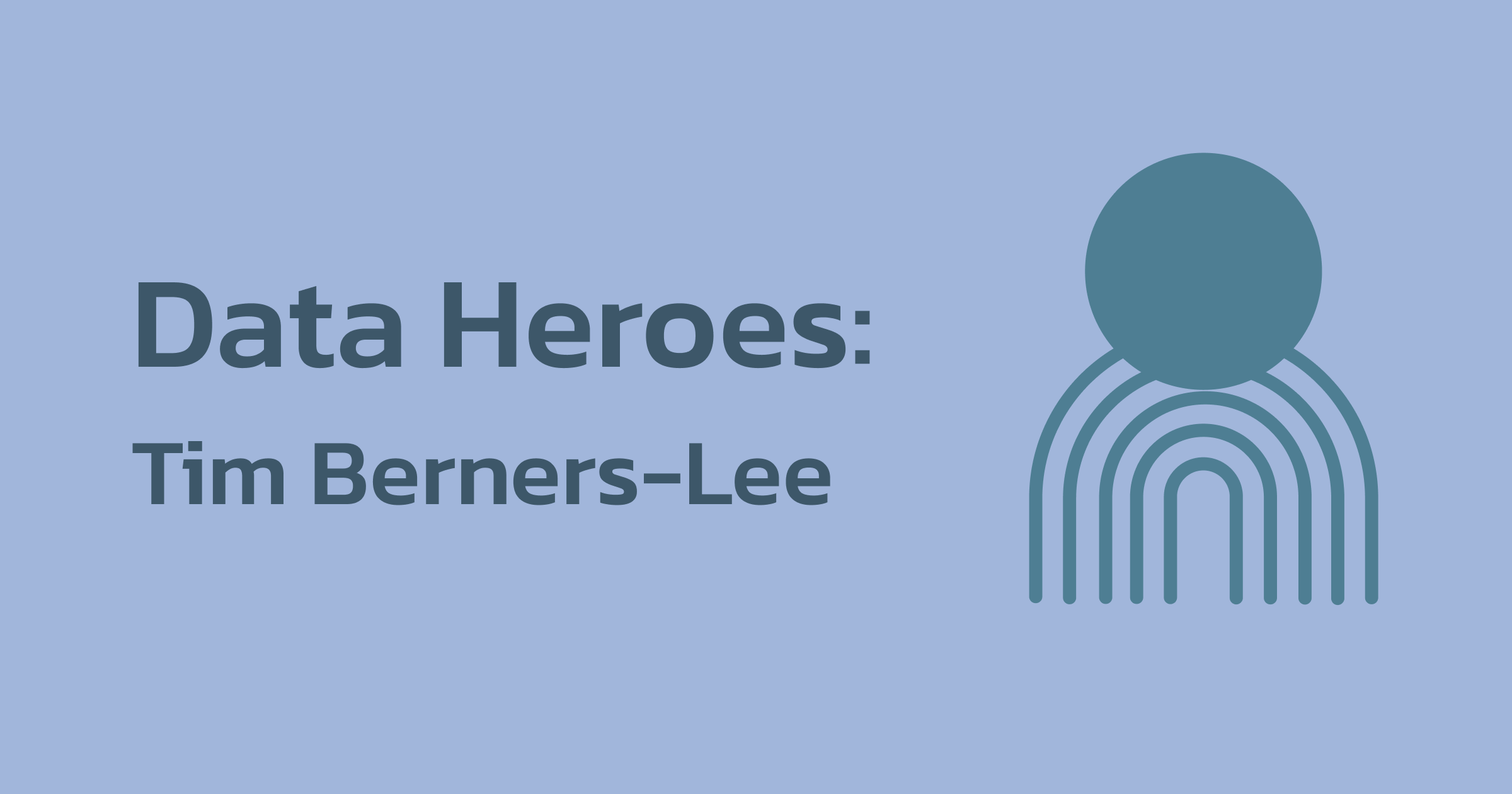
At OCSI, we use open data to drive social good, turning complex raw datasets into easily interpretable insights that make a real difference.
Our work is made possible by industry pioneers like Sir Tim Berners-Lee, whose creation of the World Wide Web and advocacy for open data has laid the foundation of modern data practices.
In this blog, the first in our Data Heroes series, we celebrate his ground-breaking contributions, and their lasting impact on our work.
Sir Tim Berners-Lee, born in 1955 in London, studied physics at the University of Oxford where he developed an interest in software engineering, and eventually started working at CERN (The European Organisation for Nuclear Research) in 1989.
It was while working here that he developed the world’s first web browser and server, laying the foundations for the adoption of the World Wide Web (WWW) after CERN released its software into the public domain in 1993.
Berners-Lee not only laid the groundwork for the WWW, but set standards for openness and interoperability (the ability of computer systems to speak to one another), to ensure that the web remained a space for anyone and everyone to use.
He founded the World Wide Web Consortium in 1994 to work on setting initial standards for the creation and adoption of web resources, before going on to develop and publicise open data practices as a way of tackling complex modern social challenges.
Berners-Lee’s commitment to making data accessible, and his focus on encouraging its use to promote social good, directly aligns with our social mission at OCSI – to do good with data.

Berners-Lee’s push for interconnectivity could be said to have been realised in the UK in 2010, following the launch of the data.gov.uk platform. For the first time, thousands of government datasets were made available to the public, covering anything from healthcare and transportation, to education and more.
Access to this data has directly helped to:
This set the standard for data sharing between national and local government, as well as making the UK a global leader in open data policies, predating initiatives like the European Data Portal, or the US Government’s data.gov website.
In 2012, Berners-Lee co-founded the Open Data Institute (ODI) alongside Sir Nigel Shadbolt, which was established to champion and promote the value of open data, especially when addressing complex issues like socioeconomic or environmental challenges between nations – ensuring that government data is made available to drive social good.
The key principle of the ODI is that all data should be accessible, standardised and reusable in order to similarly improve transparency, policymaking and innovation. The ODI aims to affect change in these areas by influencing global policy in a more direct manner. This includes partnerships with governments, businesses and non-profits to promote the benefits of open data, as well as by commissioning pieces of extended research to further promote their mission. You can read an example of this, exploring the effect that open data practices could have on boosting UK GDP here.
Tim Berners-Lee’s vision for interconnected databases and his advocacy for open data practices laid the foundation for a lot of the work we do at OCSI.
To be precise, the vast majority of our research work depends on open data. Without it, we’d be unable to support organisations working for social good to make evidence-based decisions.
In addition, our place-based data platform Local Insight contains over 1,500 indicators – with over 200 of those datasets made available via data.gov.uk.
It’s not an overexaggeration to state that without these, and many other open-source datasets, we would not be able to do the work that we do.
Our work to drive change is reflected in a number of recent case studies, where we have used open data to complete small area analysis and identify pockets of deprivation, helping to direct funding to those that need it most.
Left behind neighbourhoods in Essex – A case study: This case study explores ‘left behind’ neighbourhoods in Essex, analysing social infrastructure gaps, economic disadvantages and community challenges to help specifically direct funding and improve local outcomes.
How Everton in the Community use Local Insight to strengthen funding bids: Everton in the Community uses Local Insight to help with funding bids by providing specific evidence of local needs, and securing resources for impactful, community-focused projects.
Reaching Potential: OCSI’s work with the Foundation to understand the challenges in Sussex: This report looks at socio-economic challenges in Sussex, emphasising inequality, community needs and funding gaps, again forming the basis for funding & resource allocation in the area.
Find out more about our research services.
Local Insight gives you the tools you need to get insights on the areas that matter most to you, turning raw datasets into interactive maps, reports and dashboards.
With over 1,500+ datasets available at neighbourhood level, Local Insight can be used to make specific analysis for the areas that matter to you most – with a low admin overhead.
Get in touch with us for a demo, and a free 2-week trial: https://localinsight.org/book-a-demo/
London is often characterised as a city of wealth and opportunity, yet…
More
The Welsh Index of Multiple Deprivation (WIMD) is the official measure of…
More